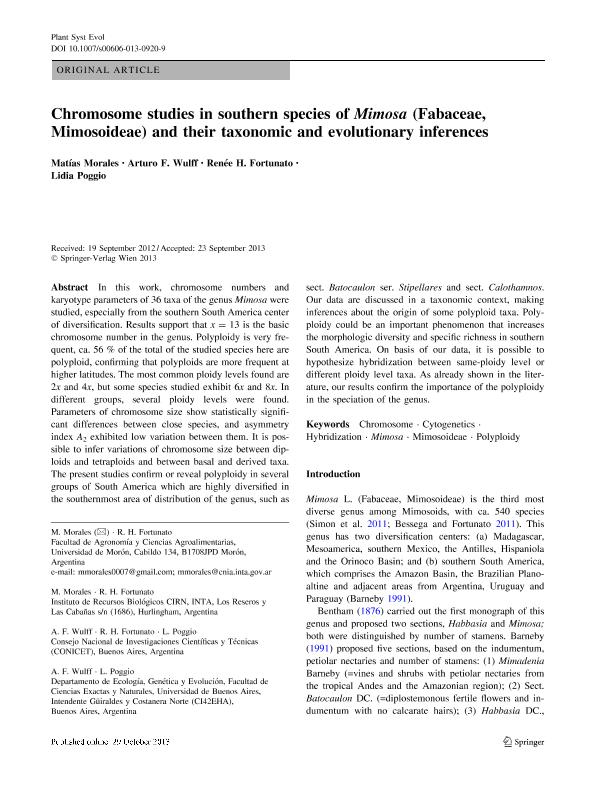Mostrar el registro sencillo del ítem
dc.contributor.author
Morales, Matias

dc.contributor.author
Wulff, Arturo Federico

dc.contributor.author
Fortunato, Renee Hersilia

dc.contributor.author
Poggio, Lidia

dc.date.available
2017-04-24T19:04:33Z
dc.date.issued
2014-05
dc.identifier.citation
Morales, Matias; Wulff, Arturo Federico; Fortunato, Renee Hersilia; Poggio, Lidia; Chromosome studies in southern species of Mimosa (Fabaceae, Mimosoideae) and their taxonomic and evolutionary inferences; Springer Wien; Plant Systematics And Evolution; 300; 5; 5-2014; 803-817
dc.identifier.issn
0378-2697
dc.identifier.uri
http://hdl.handle.net/11336/15659
dc.description.abstract
In this work, chromosome numbers and karyotype parameters of 36 taxa of the genus Mimosa were studied, especially from the southern South America center of diversification. Results support that x = 13 is the basic chromosome number in the genus. Polyploidy is very frequent, ca. 56 % of the total of the studied species here are polyploid, confirming that polyploids are more frequent at higher latitudes. The most common ploidy levels found are 2x and 4x, but some species studied exhibit 6x and 8x. In different groups, several ploidy levels were found. Parameters of chromosome size show statistically signifi- cant differences between close species, and asymmetry index A2 exhibited low variation between them. It is possible to infer variations of chromosome size between diploids and tetraploids and between basal and derived taxa. The present studies confirm or reveal polyploidy in several groups of South America which are highly diversified in the southernmost area of distribution of the genus, such as sect. Batocaulon ser. Stipellares and sect. Calothamnos. Our data are discussed in a taxonomic context, making inferences about the origin of some polyploid taxa. Polyploidy could be an important phenomenon that increases the morphologic diversity and specific richness in southern South America. On basis of our data, it is possible to hypothesize hybridization between same-ploidy level or different ploidy level taxa. As already shown in the literature, our results confirm the importance of the polyploidy in the speciation of the genus.
dc.format
application/pdf
dc.language.iso
eng
dc.publisher
Springer Wien

dc.rights
info:eu-repo/semantics/openAccess
dc.rights.uri
https://creativecommons.org/licenses/by-nc-sa/2.5/ar/
dc.subject
Chromosome
dc.subject
Cytogenetics
dc.subject
Hybridization
dc.subject
Mimosa
dc.subject.classification
Biología Celular, Microbiología

dc.subject.classification
Ciencias Biológicas

dc.subject.classification
CIENCIAS NATURALES Y EXACTAS

dc.title
Chromosome studies in southern species of Mimosa (Fabaceae, Mimosoideae) and their taxonomic and evolutionary inferences
dc.type
info:eu-repo/semantics/article
dc.type
info:ar-repo/semantics/artículo
dc.type
info:eu-repo/semantics/publishedVersion
dc.date.updated
2017-04-24T14:49:46Z
dc.identifier.eissn
1615-6110
dc.journal.volume
300
dc.journal.number
5
dc.journal.pagination
803-817
dc.journal.pais
Austria

dc.journal.ciudad
Viena
dc.description.fil
Fil: Morales, Matias. Universidad de Moron. Facultad de Agronomia y Ciencias Agroalimentarias; Argentina. Instituto Nacional de Tecnología Agropecuaria. Centro de Investigación de Recursos Naturales. Instituto de Recursos Biologicos; Argentina. Consejo Nacional de Investigaciones Científicas y Técnicas; Argentina
dc.description.fil
Fil: Wulff, Arturo Federico. Universidad de Buenos Aires. Facultad de Ciencias Exactas y Naturales. Departamento de Ecología, Genética y Evolución; Argentina. Consejo Nacional de Investigaciones Científicas y Técnicas; Argentina
dc.description.fil
Fil: Fortunato, Renee Hersilia. Universidad de Moron. Facultad de Agronomia y Ciencias Agroalimentarias; Argentina. Instituto Nacional de Tecnología Agropecuaria. Centro de Investigación de Recursos Naturales. Instituto de Recursos Biologicos; Argentina. Consejo Nacional de Investigaciones Científicas y Técnicas; Argentina
dc.description.fil
Fil: Poggio, Lidia. Universidad de Buenos Aires. Facultad de Ciencias Exactas y Naturales. Departamento de Ecología, Genética y Evolución; Argentina. Consejo Nacional de Investigaciones Científicas y Técnicas; Argentina
dc.journal.title
Plant Systematics And Evolution

dc.relation.alternativeid
info:eu-repo/semantics/altIdentifier/doi/http://dx.doi.org/10.1007/s00606-013-0920-9
dc.relation.alternativeid
info:eu-repo/semantics/altIdentifier/url/https://link.springer.com/article/10.1007%2Fs00606-013-0920-9
Archivos asociados
